See all our coronavirus coverage.
Led by exhibitions and event management giant Freeman, Go LIVE Together put together and advocacy group with hundreds of member organizations at breakneck speed.
Being on the ground—literally—at meetings, conventions and exhibitions also gives the Dallas-based company a unique perspective on what the “new normal” will look like when we start gathering again.
What will this new world look like? Will the government step in to regulate the industry? How is the conventions and exhibitions industry especially well-suited to meeting challenges such as social distancing and sanitation policies?
Meetings Today’s Tyler Davidson talked with Sue Sung, senior vice president of corporate strategy for Freeman, about the ambitious efforts of Go LIVE Together as well as what the brave new world of meetings, conventions and exhibitions will look like after the COVID-19 shutdown ends.
Listen below.
Also available on iTunes, Google Play and Pocket Casts.



Rather read the transcript?
[Start Transcript]
Tyler Davidson: Hello, and welcome to this Meetings Today Podcast. I’m Tyler Davidson, vice president and chief content director for Meetings Today, and today we are joined by Sue Sung, senior vice president of corporate strategy for Freeman. Thanks for joining us, Sue.
Sue Sung: Thanks for having me, Tyler. Glad to be here.
Tyler: And we’re here to talk about this really ambitious effort called Go LIVE Together that I think Freeman is really spearheading, but it has a lot of different partners. And it’s about financial relief for the live events industry, in relation to the shutdown from COVID. But it’s much more, too, so before I start explaining it all, maybe we should turn it over to Sue to explain kind of basically what Go LIVE Together encompasses.
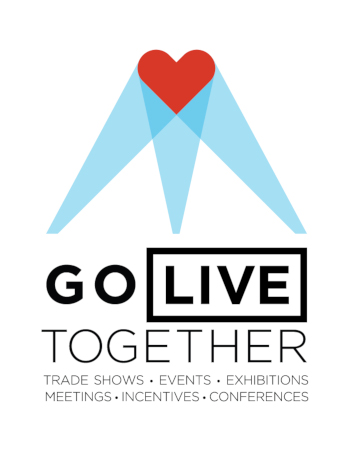 Sue: Yeah, absolutely. So, in short, Go LIVE is advocating for financial relief necessary to sustain the live events ecosystem, and so that will lead to the breadth and depth of the coalition that we’ve been able to form, which quite frankly was even a surprise to me, but definitely reflects just how important this system is to so many businesses—many of them small, many of them women and minority owned—and just the criticality of being able to get our industry and our people back to work as soon as it is safe to do so.
Sue: Yeah, absolutely. So, in short, Go LIVE is advocating for financial relief necessary to sustain the live events ecosystem, and so that will lead to the breadth and depth of the coalition that we’ve been able to form, which quite frankly was even a surprise to me, but definitely reflects just how important this system is to so many businesses—many of them small, many of them women and minority owned—and just the criticality of being able to get our industry and our people back to work as soon as it is safe to do so.
Tyler: And I did notice; I was very impressed how fast you ramped this up. I mean, you got this up in a matter of a couple of weeks from the start to where we’re at now. You are probably just three weeks or a month into this effort?
Sue: Yeah. So we are headed into week three since we launched. You’re absolutely right, from the time that our CEO first asked us to put something together to the time that we launched the website was a week and a half. We launched with 80 founding members.
Since then we’ve been signing on hundreds of folks daily. We now have over 600 logos on the website; we have over 1,700 partners who have signed on with more coming in every day.
Tyler: And, of course, it’s great that Freeman is sort of spearheading this because you did mention, Freeman is a global leader in live events, in a variety of different services, etc., they provide, but you did mention that there’s a lot of smaller companies that just don’t have probably the resources to do something like this like Freeman does.
Sue: Absolutely. And the beauty of this—so I’m not from the events industry; I’m a consultant by background—but I have to say just my involvement in here; I had the opportunity to meet some great people who have been in the industry for decades and just everybody coming together—“What can we do to help?”
We’ve got our competitors who have signed up and who have been great partners in this, and everybody’s willingness and understanding that we really are in this together, and just in acknowledgement of just what a great industry the events industry is, and how much it can contribute to economies and really in helping the recovery. I’m just thankful that I’m working at a place like Freeman, who has the opportunity to be able to help.
[Related: Here’s What Hotels and Resorts Are Doing to Enhance Health and Sanitation Standards]
Tyler: And I think the million-dollar question everyone has right now is once we do sort of get back to business and start meeting again, what is this new normal going to look like? With, say, social distancing, sanitation requirements? I know the big hotel chains are coming out very fast with different procedures that they’re implementing for, say, sanitation.
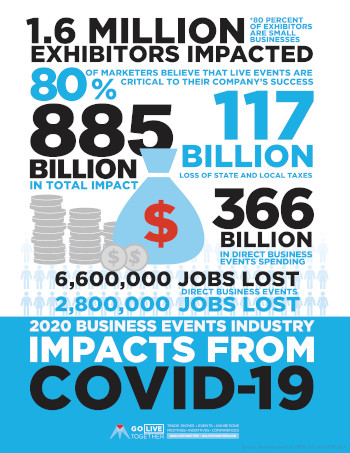 And I know you’re working with the American Hospitality and Lodging Association, too, and I think they just issued a whole new set of guidelines—as well as U.S. Travel—just in the last couple days. So, I know you can’t detail it all, but what’s your opinion on what we’re going to be seeing when we get back to meeting?
And I know you’re working with the American Hospitality and Lodging Association, too, and I think they just issued a whole new set of guidelines—as well as U.S. Travel—just in the last couple days. So, I know you can’t detail it all, but what’s your opinion on what we’re going to be seeing when we get back to meeting?
Sue: Yeah, so putting on my Go LIVE Together hat, what we’re hoping to do right now is just serve as a central repository to find information. So we have links to all of those resources that you just mentioned. As guidelines are coming on, we’re providing those resources on the site.
We have links to all of our partner associations who are doing an amazing job kind of keeping their membership and constituents up to date on the latest changes. We now have links to U.S. Chamber [of Commerce] and other resources with regards to stay at home policies and when those might be opening up again. So, we’re really trying to consolidate the resources and make them accessible to our audience as easily as possible.
That being said, with regards to safety in particular, in addition to U.S. Travel there are other entities that are working on some guidelines. Freeman’s working with the Global Biorisk Advisory Council [GBAC] that is looking to set up standards and certifications. They’re an interesting group because they not only work with venues, but they’re also working with the hotels and they’re working with the airlines. And Hyatt actually issued its press release stating that they were going to be following the GBAC standards.
We have a lot of folks who are working on being able to open this safely, and most importantly, sustainably.
[Check this out: The Broadmoor Ups Its Tradeshow Game With New Broadmoor Exhibit Hall]
When you take a look at the dozens of hotels and other entities, they’re talking to medical experts, they’re following CDC guidelines, they’re following the WHO guidelines. They have industry, medical staff looking at this from a scientific way so it gives you confidence that they’re not just looking to open safely, but they’re looking to open safely and sustainably to be sure that we’re guaranteeing the safety of participants when the stay at home orders start to start to reopen.
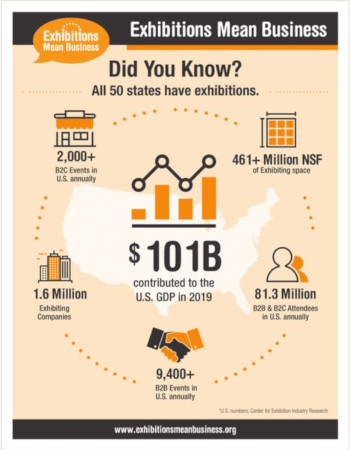 Tyler: Yeah, and the more I think about this, too, is that the participants have a big stake in this. And if they don’t feel comfortable to travel, or stay in a hotel, even if you open those hotels up and you get the airlines back in the air, it’s not going to make a difference. Right?
Tyler: Yeah, and the more I think about this, too, is that the participants have a big stake in this. And if they don’t feel comfortable to travel, or stay in a hotel, even if you open those hotels up and you get the airlines back in the air, it’s not going to make a difference. Right?
Sue: Exactly. And I think one thing that’s important or that I just started to realize, too; when you think about an event and where events take place, usually they are in convention centers, or conference centers, or large meeting rooms.
Those are blank slates from our perspective, and we have a unique opportunity versus restaurants and theaters or sports arenas that are already fixed, if you will.
To be able to really design for safe social distancing, you can do it through how you set up your aisles and your exhibits to what kind of markers you put in, so I think we have a unique opportunity to really design for safety in a way that other venues perhaps are a little less able or have less flexibility to accommodate.
[Related: Industry in Crisis: Roger Dow Details the Travel Industry Economic and Jobs Impact of COVID-19]
Tyler: That is a real interesting point, and it’s a little more achievable quicker in something like a convention center that is open, like a blank slate, and where someone like your company or others completely control the environment from start to finish. Right?
Sue: Exactly.
Tyler: Interesting. And then I’m just wondering if people might be confused or wondering, how do your efforts differ in any respect, say, to the U.S. Travel Association, which is lobbying the federal government? Where do you kind of fit into the ecosystem of groups trying to advocate for the live events industry?
Sue: Yeah, that’s a great point. We’re actually working really closely with U.S. Travel. They’ve been a great partner. Obviously, they’ve got a very strong advocacy arm, and they’ve been giving us some good guidance.
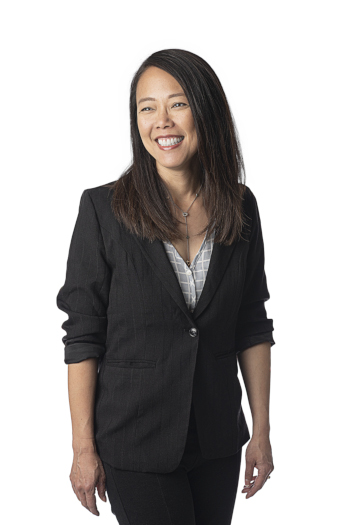 (Photo: Sue Sung, Senior Vice President of Corporate Strategy for Freeman)
(Photo: Sue Sung, Senior Vice President of Corporate Strategy for Freeman)
We also recognize that they’re servicing a really broad constituent base. And so events being just one, but they also have the airlines and they also have the hotels and they have others. And so, we really want to make sure that we are advocating on behalf of the live events industry in particular.
We have some unique aspects of our business. Exhibitors, for one, right? They don’t exist in any other industry. And it’s expensive to go to events. But we have data that shows that the return on exhibitions for some of these guys is 4x of their investment. Seventy-four percent of associations rely on their meetings for revenue generation like this.
We need live events. The exhibitors, the companies, the participants in it need it to transact business. So this is their marketing budget for the year. So, from that perspective, while it’s related to the efforts of a U.S. Travel and others, we are unique.
[Related: How Live Event Entertainers Are Going Virtual]
Tyler: Yeah, that’s a very good point. Before we wrap it up, maybe you can just put on your predictive hat, or whatever, but say and we were to be very optimistic and we’re at a meeting a month from now or two months from now. How do you think that environment is going to look different than before the whole pandemic hit?
Sue: I think you’re going to see a lot of what we’re seeing in our daily lives, right? You’re going to see social distancing measures, I believe, keeping folks six feet apart. I think you’re going to see an increased prevalence of PPE [personal protective equipment]—masks, gloves. I think you’re going to see more visible sanitation and cleaning measures happening. Again, to give consumer confidence.
So, the hand sanitizing stations, for example—increased frequency. I think there are going to be just more, as you’ve seen in some of the grocery stores and other venues as well, just kind of more visible demonstrations of the degree to which the event organizers, venues, participants are doing what they can to ensure safety.
Tyler: Yeah, because there is that whole part of it, where you really need to reassure the public, too, before they come to a large gathering, that everything’s been ensured for their safety.
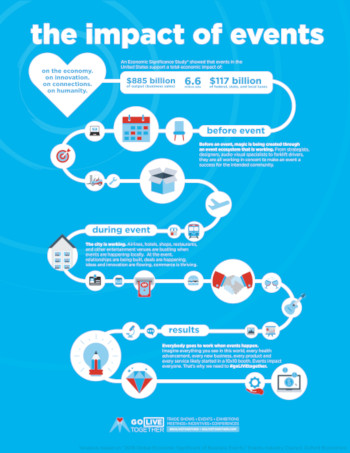 Sue: Absolutely. And I think, on the point of the large gathering—and I’m talking just as a consumer of the news—in many cases, it really is about compliance. It’s not the guidelines themselves. And so, it’s all about trying to reduce your chances of spreading the virus or contracting the virus.
Sue: Absolutely. And I think, on the point of the large gathering—and I’m talking just as a consumer of the news—in many cases, it really is about compliance. It’s not the guidelines themselves. And so, it’s all about trying to reduce your chances of spreading the virus or contracting the virus.
I think as long as you’re adhering to the guidelines—and as I said earlier, events have a unique ability to control an environment differently than other venues. I think we have a strong case to be able to do that, regardless of the number, because as we’ve seen globally, is that number 10, is the number 50, is the number 150? It’s really about reducing your chances. And again, I think our industry is working really hard and collaboratively to be able to mitigate those chances to the extent possible.
Tyler: And I’m guessing, too, that the industry and the various aspects of it want to get out ahead of this, so they can show any possible government regulators that they have a handle on this, and that they can control the environment. So, they can sort of, I don’t know, take the regulation upon themselves rather than maybe having regulations forced upon them?
[Related: Inspiring Stories from the Meetings Industry During the Coronavirus Crisis]
Sue: Yeah, absolutely. I think when you start to get into the regulatory environment it adds a layer of complexity. The government would then have to invest in compliance and auditing, and there are expenses related to regulations.
Quite frankly, the folks that we’ve spoken to, who have contacts at the CDC and other places, they recognize that they can’t possibly understand the nuances of every industry in order to be able to set the right kinds of regulations. So, it’s really a blunt force instrument that has to happen at the highest level, and they recognize that, so I don’t think that’s an area they want to be able to go into.
We all want the same thing. We want to be able to reopen the economy safely. We want to be able to do it in a sustainable way. And what I mean by that is, obviously we could open, and we could be fine for a couple weeks, but without certain measures, there’s a concern about having a second or third wave.
So, we all collectively want to avoid that situation, and we’re using the best information we have at hand about this virus and about epidemiology and controlling these kinds of outbreaks to be able to do that safely and effectively.
Tyler: Well, great. And if people are interested in learning more about this effort or joining it, where can they find out more information?
Sue: They can go to our website at golivetogether.com.
Tyler: Great. Well, thank you for joining us, Sue.
Sue: Thank you for having me. I appreciate the opportunity to speak to you and your listeners.
Tyler: Great. Thank you. And thank you out there for listening to this Meetings Today Podcast.
Head on over to MeetingsToday, where we have a wealth of podcasts featuring industry thought leaders on all sorts of great topics, especially a lot involving the pandemic and the industry coming back from it.
We hope you enjoy all of our content and have a great rest of the day. Thank you.
[End transcription]
Read next: Wynn Las Vegas Unveils Health Plan, Vegas Strip to Slowly Reopen






